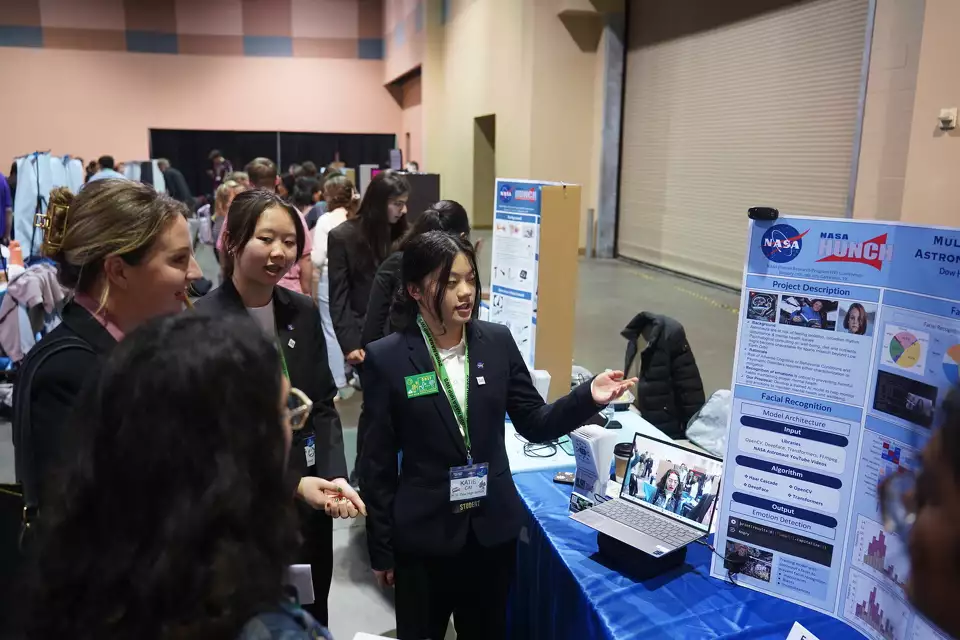AI Mental Health Tools Built by High School Students: How Teens Are Supporting Astronauts
- BetterMind Labs

- Jul 10, 2025
- 3 min read
Updated: Aug 19, 2025
Let’s start with a simple question:
What does mental health look like... in zero gravity?
That’s the kind of challenge a group of high school students in Michigan took on, and what they built could actually end up helping NASA astronauts cope with isolation during long space missions.
Here’s the story of VISTA-AI, and why it matters for every student thinking, “Can I really make a difference while I’m still in high school?”

From a Michigan High School to a NASA Workshop
VISTA-AI is one of the most promising AI mental health tools built by high school students. Created by a group from Michigan, it uses facial expression analysis and tone recognition to monitor astronaut well-being—Track mental states over time, something that’s crucial for astronauts on extended missions.
Their idea was smart. But what happened next was next-level.
They were invited to present their work at the NASA Human Research Program Investigators’ Workshop in Texas. There, they got direct feedback from scientists, engineers, and even astronaut Frank Rubio, who spent nearly a full year on the International Space Station.
Yes, you read that right: high schoolers explaining their invention to someone who's literally lived in space.
And they didn’t stop there. The team later showcased their work at the NASA HUNCH Final Design Review in Houston, continuing to refine the tool based on real-world input.

Why AI Mental Health Tools Built by High School Students Matter in Space
Imagine spending 6 months or more in a small spacecraft, millions of miles from Earth, with no escape from your environment. No nature. No fresh air. Limited human interaction.
Mental health in space isn’t just a side topic; it’s mission-critical.
That’s what makes VISTA-AI such a smart approach. It gives astronauts and mission teams a way to spot emotional red flags early, using passive data like facial tension or voice stress.
This isn’t just theoretical. If VISTA-AI keeps evolving, it could help astronauts on future moon bases, Mars missions, and even commercial space flights.
So What Does This Mean for You?
Here’s the thing: you don’t have to wait until college or even graduation to start working on problems that matter.
Students across North America are doing real, impactful work right now. Whether it's AI in space, mental health, sustainability, or education, there’s room for young thinkers at the table.
Take Zahra Azeem, for example. She’s an alumni at BetterMind Labs, a program where teens explore personalized projects that blend AI, empathy, and innovation. Zahra built Serenity AI, a wellness chatbot that helps people reflect, journal, and receive personalized mental health suggestions. It even uses AI-driven prescription generation, all built on Streamlit, a Python-based app platform.
Her project didn’t just impress mentors. It reminded everyone that when students care deeply about a problem and have the right guidance, they can actually move the needle.
How to Get Started
If you’re a student:
You don’t need to wait for a big lab or fancy grant. Start small. Get curious. Find a question that bugs you, and build something that tries to answer it.
If you’re a parent:
Support your child’s curiosity. Give them space to tinker, explore, and fail. Programs like BetterMind Labs exist to help kids turn passion into direction.
Because the future isn’t just about getting into college. It’s about shaping the world you want to live in, whether that’s here on Earth, or 250 miles above it.
Relevant Links:
NASA Human Research Program – IWS 2025
NASA HUNCH Program – High School Students United with NASA to Create Hardware
How AI Mental Health Tools Built by High School Students Are Helping Astronauts in Space
Streamlit – The Fastest Way to Build and Share Data Apps
How Astronauts Take Care of Their Mental Health in Space
BetterMind Labs – AI Projects by High School Students






Comments